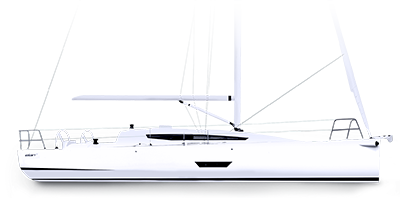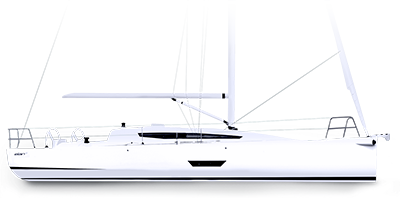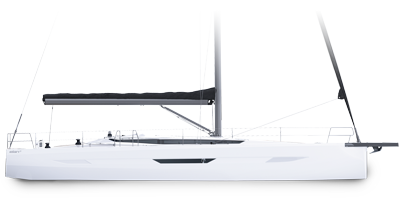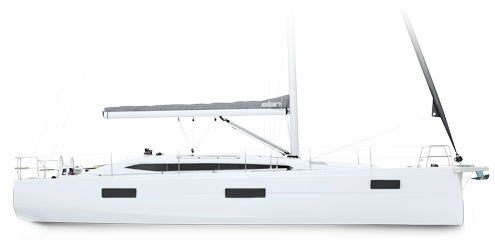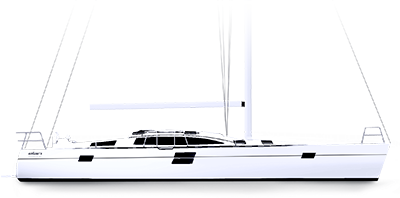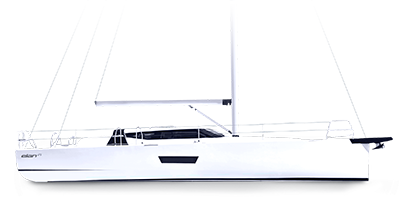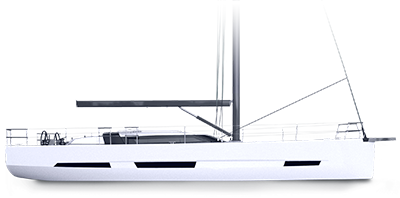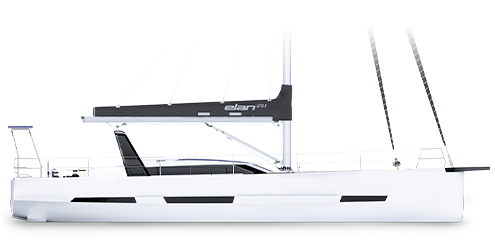Elan technology
Elan Technology Interface
Welcome to Elan's technology interface. Please slide left or right to progress through points or click the middle button and pick from the menu.
Marine Standard Elan Bulkheads
The standard bulkheads used in our yachts are constructed of marine-grade plywood laminated into the deck, hull and inner structure to stiffen the yacht. This is the only way to ensure a good distribution of mechanical loads and is a requirement to lessen any kind of skewing or twisting of the yacht under pressure
Available on:
E4
Impression 45
Impression 50.1
GT6 Explorer
Composite Bulkheads
A step up from the Marine Standard bulkheads, the composite version ensures an unbroken surface along the bulkhead and an equal distribution of mechanical loads through the cross-section. The vacuum-cured epoxy-resin-impregnated biaxial fabric takes the stiffness and durability to the next level and ensures the most compact structure.
Available on:
Impression 50.1
E5
E6
GT Line
E4 Pure Performance
GT6 Explorer
Vacuum-Assisted Infusion Lamination
As the only sure way to prevent osmosis, and to ensure uniform stiffness, lightness and safety the modern sailing yachts require, Elan was one of the first serial yacht manufacturers to adopt the Vacuum-Assisted Infusion Lamination back in 2003. All Elan hulls are now produced through an advanced version of that VAIL technology. VAIL enables the complete saturation of epoxy resin and removes human error from the process.
How does VAIL work?
The first step of the VAIL procedure is the spray application of the gelcoat. Then, the thin vinyl ester outer skin is applied by hand to ensure complete saturation and osmosis protection. This process is then followed by a careful layout of the multiaxial fabrics, PVC and SAN foam cores through an advanced model-specific laminate plan. After being hermetically sealed, the ISO NPG polyester (or vinyl ester resin as an option) is pulled through a network of distribution tubes by a vacuum. The hull is then cured in a temperature-controlled environment to ensure perfect curing before the sealing is removed.
Benefits to the Customer and the Environment
This VAIL process allows for weight savings of up to 25% on composite parts and ensures considerable improvement of the hull’s mechanical properties. The “one-shot” nature of the process secures the bonding between the fibres and the core, thus reducing the possibility of laminate failure. It is a closed-mould process that negates the risk involved with the volatility of organic compounds, drastically improving the working conditions, saving industrial waste and protecting the environment.
3D Vacuum-Assisted Infusion Lamination
A step up from the VAIL process is the 3D VAIL technology. In essence, 3D VAIL technology integrates the yacht’s inner structure, stringers and stringer supports (depending on the yacht model) into the hull itself using vacuum-assisted infusion. When fully applied, this complicated and expensive process creates a one-piece laminated structure out of all the load-bearing elements of the yacht, increasing the stiffness and lightness and ensuring the best mechanical properties. This converts into forward forces on the mast to fully convert into forward momentum without energy loss. 3D VAIL also ensures the best possible seaworthiness of the yacht, as the whole interior acts like a single piece and cannot be influenced by rough sea conditions.
VAIL TECHNOLOGIES BY YACHT:
VAIL hull: All Elan Yachts
VAIL deck: All Elan Yachts
3D VAIL hull, full: GT5, GT6, GT6 Explorer
3D VAIL Stringers: E5, E6, Impression 45, Impression 50.1
Hull and Deck Structure and Sandwich Laminate
A step up from the VAIL process is the 3D VAIL technology. In essence, 3D VAIL technology integrates the inner yacht structure, stringers, and stringer supports (depending on the yacht model) into the hull itself using vacuum-assisted infusion. When fully applied, this complicated and expensive process creates a one-piece laminated structure out of all the load-bearing elements of the yacht, increasing the stiffness and lightness and ensuring the best mechanical properties. This converts into forward forces on the mast to fully convert into forward momentum without energy loss. 3D VAIL also ensures the best possible seaworthiness of the yacht, as the whole interior acts like a single piece and cannot be influenced by rough sea conditions.
VAIL TECHNOLOGIES BY YACHT:
VAIL hull: All Elan Yachts
VAIL deck: All Elan Yachts
3D VAIL hull, full: GT5, GT6, GT6 Explorer
3D VAIL Stringers: E5, E6, Impression 45, Impression 50.1
U Shaped Keel Mounting Plate
The Elan E Line and GT line are equipped with U profile keel mounting plates, specially designed to improve load distribution and prevent hull damage in emergencies. The stainless steel backing plate is custom-made for each yacht.
Trapezoidal Pyramid Recessed Hull Keel Mount
The unique trapezoidal pyramid keel mount permits seamless hull and keel fusion, facilitating the best force transmission and increases the area of load distribution, ensuring safer and more effective sailing.
Available on:
Elan E Line
Elan GT Line
Chainplates
The Elan E line yachts and Impression 50.1 feature custom chainplates with a backing plate for optimum load distribution. The chainplates are positioned in-line with 3D VAIL stringers.
This results in a monolithic structure and increases the safety and rigidity of the rigging.
Available on:
Elan E Line
Impression 50.1
The Elan GT line yachts feature custom chainplates with a laminated backing plate for optimum load distribution. The chainplates are positioned in-line with 3D VAIL stringers.
This results in a monolithic structure and increases the safety and rigidity of the rigging.
Available on: Elan GT Line
The Elan Impression 45 yachts feature custom chainplates connected to the inner hull via an Interior force distribution inox structure, increasing the safety and efficiency of forces.
Available on: Impression 45
P
Elan Custom Design Rudder Blades
Elan’s special rudder blades were designed by naval architects specifically for each yacht model and constructed in-house. The unique composite rudder blades are a complete monolithic structure, optimised for rigidity, endurance and lightness. Rudders are made with aluminium shafts for lighter construction (except for the Elan Impression 40.1 and 45.1).
Available on: All Elan Yachts
Active Chine Design and Hull Form Stability
In contrast to most modern chine designs, which are included on yachts for aesthetics and internal volume, Elan chines are introduced into the hull geometry by Humphreys Yacht Design to introduce a better righting moment and allows the design to carry or share a lot of the righting moment requirements within the hull form itself. This results in moderation of the keel ballast weight, helps drive displacement down and leads to a notable increase in the performance of the hull. The chined hull helps with the yachts tracking ability upwind and cleans off the wake, giving the yacht improved speed and control downwind. When heeled at a perfect angle, the yacht attains an optimum underwater hull shape with a small wetted surface for minimum drag. The chines can also prevent broaching because they function as long skegs.
Available on:
Elan E Line
Elan GT Line
Computational Fluid Dynamic Testing
During the design process, all Elan hulls were subjected to extensive Computational Fluid Dynamic testing, executed by the world-renowned Humphreys Yacht Design. Powerful hull geometries are famous for merging art and science; therefore, the best hulls are created by nautical architects with decades of experience and then extensively tested through CFD testing to fine-tune the design.
Available on: All Elan Yachts
Twin Rudder System
Due to the wider and flatter hull design, twin rudders are more efficient; providing exceptional control and reducing the tendency to broach. The yacht does not stall easily, as her pitching moment is reduced. The twin rudder system provides finger-tip directional control, especially when heeled. It enables lighter loads on the helm and easier work for the autopilot. The rudder systems are independent and negate the need for an emergency tiller.
T Shaped Keel
The T-shaped keel lowers the centre of gravity and enables enhanced sail-carrying power, increasing speed and stability of the yacht.
Keel-Stepped Mast
Enabling the most trimming options for an experienced sailor, keel-stepped masts are a must-have feature on all E Line Elan Yachts and an integral part of rigging as defined by Humphreys Yacht Design. Keel-stepped masts also offer the best safety, strength and security for sailing in challenging conditions.
Increased Beam
An increased beam optimises form stability while enabling greater internal volume, space on the deck and a stiffer feel under sail. A sophisticated hull geometry with more radius in the aft underwater hull sections is better balanced with fuller forward sections to increase the beam without increasing drag.

